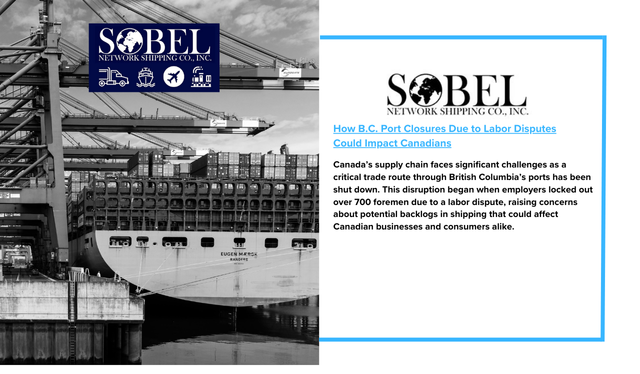Canada’s supply chain faces significant challenges as a critical trade route through British Columbia’s ports has been shut down. This disruption began when employers locked out over 700 foremen due to a labor dispute, raising concerns about potential backlogs in shipping that could affect Canadian businesses and consumers alike.
What’s Happening at B.C. Ports?
The B.C. Maritime Employers Association (BCMEA) made the decision to lock out workers after the International Longshore and Warehouse Union (ILWU) issued a 72-hour strike notice for limited job actions, set to begin Monday morning. In response, the BCMEA implemented a lockout across multiple ports, except for grain and cruise operations. The ILWU’s job action included an overtime ban and a refusal to implement new technological changes.
With Canada’s West Coast ports handling around $800 million worth of cargo each day—roughly 25% of the goods flowing through the country—the stakes are high for both businesses and consumers. According to Pascal Chan from the Canadian Chamber of Commerce, the impact of any extended closure will be felt across Canada.
The Bigger Picture: Montreal and B.C. Labor Disputes
Meanwhile, Canada’s second-largest port, Montreal, is also affected by labor disruptions. Two terminals at the port were partially shut down last week after longshore workers went on strike. This has already led some ships en route to Montreal to divert to other ports, further complicating the national supply chain.
The ILWU’s focus in British Columbia centers on job security amidst rising automation, while workers in Montreal emphasize the need for a better work-life balance. With ongoing disputes at these ports, Canadian consumers and businesses could face challenges if the disruptions persist.
Potential Impact on Canadian Consumers and Businesses
In the short term, the average Canadian is unlikely to see an immediate shortage of goods on grocery shelves or in retail stores. However, if the lockouts and strikes continue for weeks, there could be a ripple effect, particularly for smaller businesses that are less able to adapt to sudden supply chain interruptions.
For small and medium-sized enterprises, disruptions could mean higher costs and penalties for not meeting contractual obligations, as they may lack the flexibility to adjust shipment plans. Christina Santini from the Canadian Federation of Independent Business (CFIB) points out that supply chain delays could push some businesses to the brink, especially if they operate with limited inventory.
In 2023, after a 13-day strike at B.C. ports, manufacturers relying on glass imports reported significant delays in production. Today, many businesses have reduced their inventory buffer, leaving them with as little as two weeks’ worth of stock, which increases their vulnerability to supply chain hiccups.
The Broader Economic Impact
Beyond Canadian borders, these port disruptions affect global perceptions of Canada’s reliability as a trading partner. Canada’s reputation has already taken a hit due to recent supply chain challenges, including strikes at grain terminals and temporary rail closures. Hossein Piri from the University of Calgary warns that if Canada continues to face frequent trade interruptions, it could harm its standing in the global market, making it challenging to recover that reputation.
Canada’s reliance on exports also means that delays in goods leaving the country can have significant repercussions. For instance, the fertilizer industry stands to lose $9.7 million daily from the B.C. port closures, according to Fertilizer Canada.
What’s Next?
The Canadian government has stepped in, with Labor Minister Steven MacKinnon stating that federal mediators are on hand to assist with negotiations. However, the responsibility to reach an agreement lies with the employers and the union. Given the disruptions of recent years, many industry leaders and experts are urging both parties to resolve their differences quickly to avoid further damage to Canada’s supply chain and global trade reputation.
The ongoing labor disputes highlight the fragility of Canada’s supply chain and the potential risks associated with labor unrest in key logistics hubs. As Canadian businesses, workers, and consumers watch closely, it remains to be seen how these disputes will be resolved and what the lasting impact will be.


